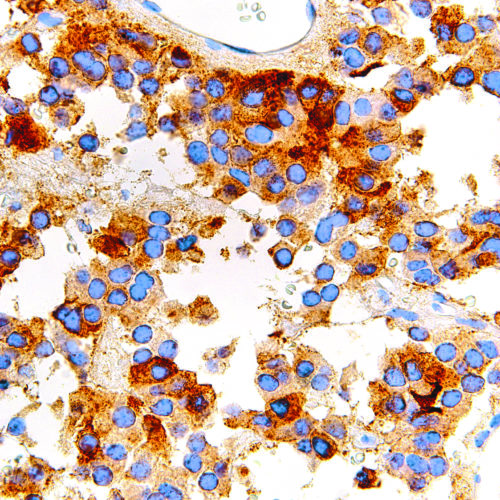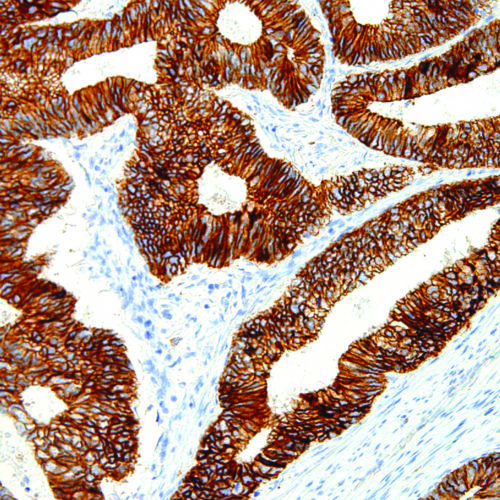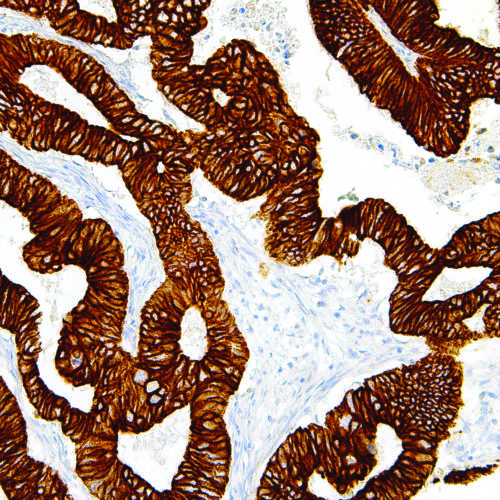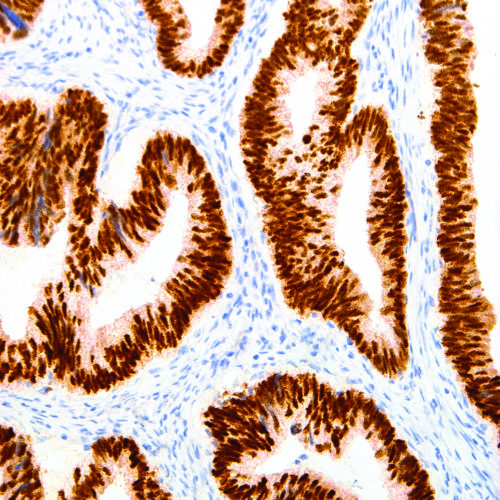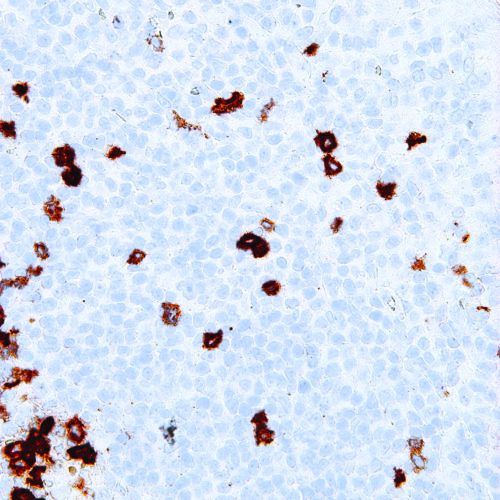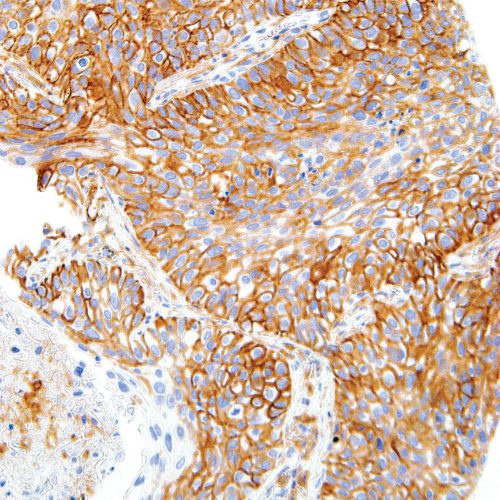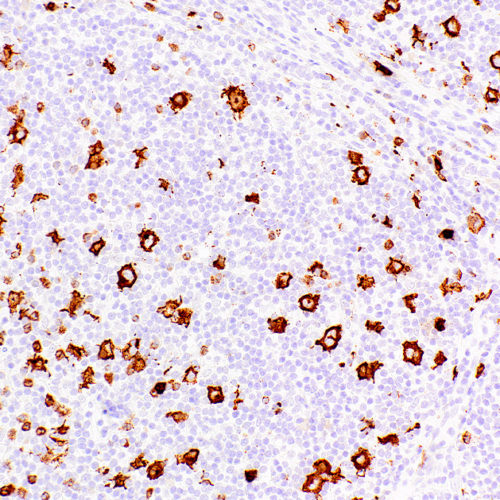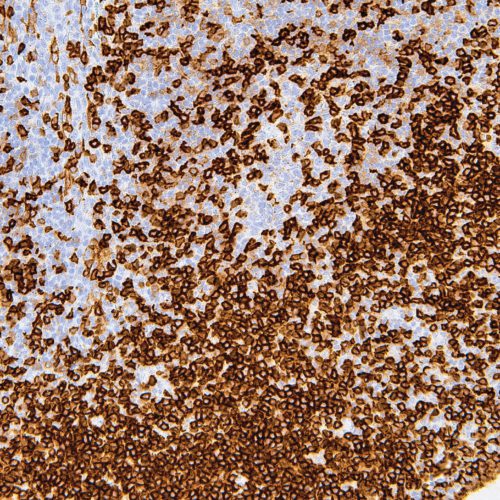High quality products to support Pathologists and Biological and Environmental Scientists
GeneAb™ FSH
$110.00 – $460.00Follicle-Stimulating Hormone (FSH) allows for progression of ovarian folliculogenesis, and enables Sertoli cell proliferation in the testis. Anti-FSH reacts with FSH-producing cells, therefore FSH staining is useful for classifying pituitary cancers and understanding pituitary disease.
GeneAb™ E-cadherin
$95.00 – $390.00E-cadherin is an intercellular adhesion molecule present in epithelial cells. Anti-E-cadherin stains glandular epithelium, as well as lung, gastrointestinal and ovarian adenocarcinomas. A panel of antibodies against E-cadherin and p120 is also used to differentiate ductal (membranous staining) and lobular breast cancer (cytoplasmic staining). Anti-E-cadherin also stains some thyroid cancers.
GeneAb™ Cytokeratin 19
$65.00 – $250.00Cytokeratin 19 (CK19) forms intermediate filaments found in the intracytoplasmic cytoskeleton of epithelial tissue and provides mechanical support. Anti-Cytokeratin 19 stains epithelia and epithelial malignancies such as carcinomas of the colon, stomach, pancreas, biliary tract, liver, and breast. Cytokeratin 19 is a useful marker for distinguishing hepatocellular carcinoma from intrahepatic cholangiocarcinoma. This differentiation is improved when stained in combination with Cytokeratin 7, CAM5.2l, Ber-EP4/MOC31, HepPar1 and TTF1. Cytokeratin 19 staining can also be used to recognize thyroid papillary carcinomas.
GeneAb™ CDX-2
$85.00 – $635.00CDX-2 is a caudal-related homeobox transcription factor that is expressed by intestinal epithelial cells. CDX-2 is a useful marker for gastrointestinal carcinoma, and for determining the origin of gastrointestinal metastatic adenocarcinoma and carcinoids. Anti-CDX-2 is used for differentiating lung and metastatic colorectal adenocarcinoma, however mucinous ovarian carcinoma also react positively with Anti-CDX-2, thereby limiting the ability to differentiate from metastatic colorectal adenocarcinoma.
GeneAb™ CD57
$70.00 – $250.00Cluster of differentiation 57 (CD57), also known as NK-1, is an antigen detectable in natural killer cells, some T-lymphocytes and normal peripheral blood mononuclear cells, myeloid cells, and a variety of polypeptides, lipids, and chondroitin sulfate proteoglycans. CD57 is indicated as a marker for tumors of neuroendocrine origin, including pheochromocytomas, paragangliomas, carcinoid tumor, and medulloblastomas, as well as various neural tumors including neuromas, neurofibromas, schwannomas, and granular cell tumors. CD57 is also detectable in ganglioneuroma and prostate carcinoma. Anti-CD57 is used to distinguish nodular lymphocyte-predominant Hodgkin’s lymphoma from T-cell/histiocyte-rich large B-cell lymphoma, nodular sclerosis Hodgkin’s disease, and follicular lymphoma.
GeneAb™ CD44
$45.00 – $160.00Cluster of differentiation 44 (CD44) is a glycoprotein receptor for hyaluronic acid, which plays a fundamental role in cellular adhesion, stromal binding, migration, and cell-cell interactions. Studies have suggested that the CD44-hyaluronate interaction is central to tumor invasiveness. Positive staining with Anti-CD44 is implicated in a multitude of different cancer types, including breast, prostatic, renal cell, colonic, hepatocellular, and genitourinary carcinomas, as well as Non-Hodgkin’s Lymphoma, metastatic melanoma, gastric cancer, and some soft tissue tumors. It has also been demonstrated that there is a positive correlation between tumor progression and increased expression of CD44v, a high molecular weight CD44 isoform that has been described in epithelial cells. Given the expression of CD44 in a wide range of cancers, the most practical application of CD44 immunostaining is its use in discriminating between urothelial transitional cell carcinoma in situ from non-neoplastic changes in the urothelium.
GeneAb™ CD15/Leu-M1
$90.00 – $370.00Cluster of differentiation 15 (CD15) is a carbohydrate adhesion molecule. Positive staining for CD15 and negative staining for leukocyte common antigen or other B- or T-cell lineage markers helps recognize Reed Sternberg cells (RSC) in Classical Hodgkin’s Lymphoma (CHL), and distinguishes it from Hodgkin-like neoplasms. CD15 does not stain mesotheliomas and is therefore most useful for distinguishing epithelial mesothelioma from adenocarcinoma.
GeneAb™ CD5
$115.00 – $785.00Cluster of differentiation 5 (CD5) is expressed in high levels on the surface of T cells, while controversy surrounds the expression levels and role of CD5 in B cells. As a part of a diagnostic panel, its utility lies predominantly as a marker for T cells, with over 70% of T cell neoplasms expressing CD5. In particular, it is correlated with chronic lymphocytic leukemia/small lymphocytic lymphomas, mantle cell lymphoma, as well as a subset of diffuse large B cell lymphomas. CD5 demonstrates positive expression in thymic carcinomas, and is not as sensitive as CD3. CD5 also has value as a prognostic indicator, being associated with poor prognosis in acute T cell lymphoblastic leukemia.
